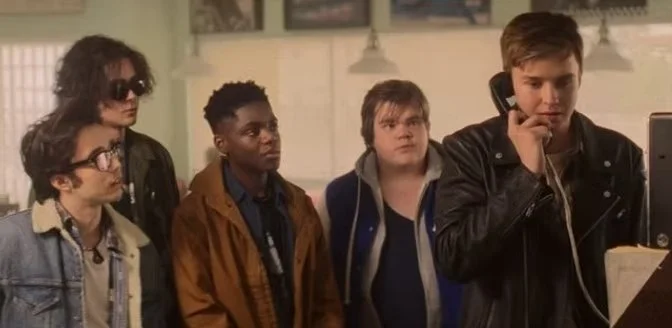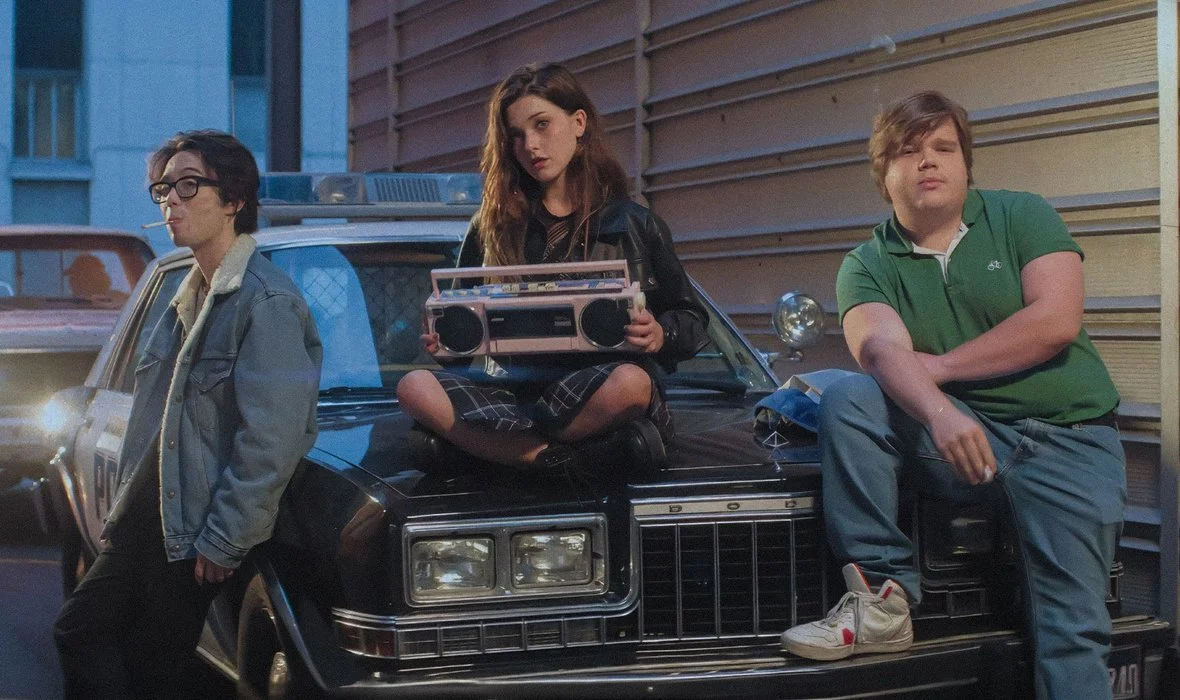'This Too Shall Pass' Review: Youth Definitely Isn't Wasted on These Young People
The film opens up in a police car, where a teenage boy sits with blood on his face and clothes. A police officer (Chris Sandiford) starts driving, and questions the teenager about how he ended up in the back of his squad car. After a moment’s hesitation, the teenager clumsily tries to narrate, much to the officer’s incredulity. All the while, “Forever Young” by Alphaville plays in the background. This might be a startling intro for those who have only seen this film’s poster, but it does a perfect job setting the mood of This Too Shall Pass.
It’s the late 1980s in Syracuse, NY. 16-year-old Simon (Maxwell Jenkins) is being completely smothered by his strict Mormon upbringing. His parents (Robert Longstreet and Alana Hawley Purvis) are constantly on his case, thanks in no small part to his jagoff older brother (David Feehan). Simon’s only escape from this suffocation is through his friends: edgy bad boy Tim (Ben Cockell), cynical film buff James (Jaylin Webb), affable party bro Chris (Jeremy Ray Taylor), and the spaced-out wild card John (Aidan Laprete). Under the guise of playing sports which his parents never attend, Simon indulges in rock & roll, movies, alcohol, cigarettes, weed, and meandering conversations with his pals. During one of these hangouts, Simon is introduced to Shelly (Nikki Roumel) who he’s keen to know a bit better when she shows some interest. Sadly, it turns out that she’s heading up north for the weekend; more specifically, she’s going to the Canadian capital city of Ottawa. Meanwhile, Simon’s repressive home life finally gets too much for him to handle. An impulsive decision results in him travelling to find Shelly in Ottawa and have a no-holds-barred weekend with his buddies. And so begins an adventure which, for better or worse, none of these guys will ever forget.
It’s debatable whether this film could be more 80s than it already is. The soundtrack is drenched in classic 80s tunes from both sides of the border and across the pond (these include songs by The Cure, New Order, and Colin James). The film was clearly made by people who either lived through the 80s themselves, or else spent most of their lives memorizing the works of John Hughes. The teenagers in the story have all watched the classics; they debate the films, deconstruct them, reference them, and try to replicate them for their own benefit. Simon, in particular, longs for the escapist optimism of these movies to be real, so that he might one day leave his awful home life behind and pursue his dreams. From almost the very beginning, his weekend trip tests him harder than he could have ever predicted.
Aside from Simon, the boy who gets the most development is his best friend, Tim. Like Simon, he has his own problems at home, what with an absent father post-divorce and a mom (Joanne Kelly) who’s too busy trying to be in her 20s again. It takes some time for his subplot to really take off, but it doesn’t shy away from genuinely serious subject matter which is every bit as 80s as the Say Anything references.
One of this film’s greatest strengths is that it never disappears up its own butt, nor does it mindlessly repeat 80s movie tropes. Certainly the film is chock-full of homages and references, but never at the expense of the story. Simon and his friends have next to nothing figured out, and why would they? The film allows them to be messy, confused, and clumsy, even as they’re occasionally struck with the sort of clarity and self-awareness that we all wish we’d had at that age. On a technical level, the film also does a fantastic job with its cinematography. David Baron should be commended for the ways he conveys a character’s emotional state through tricks of light and creative transitions.
On another note, This Too Shall Pass never brings up its own title, nor do any of the characters say it in the film. This was a wise move on the filmmakers’ part; they were confident enough in their storytelling ability that the audience would know exactly what they meant by the time the movie’s over. Best of all, this film doesn’t pretend to have all the answers. Simon and his friends are caught in the most awkward part of their lives, unsure of where they want to go from here, and some of them are unsure of who they are as people. But by the film’s conclusion, it’s clear to them and the audience that the destination is less important than the journey itself.



